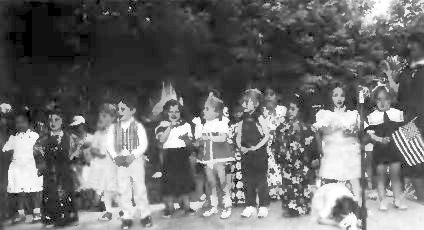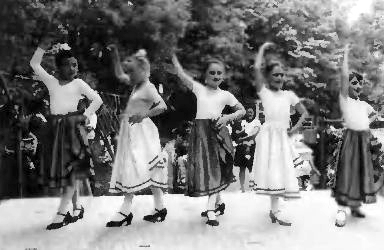![]()
The Words of the Rattley Family
|
|
The Words of the Rattley Family |

Children
perform at Jin-A Open House.
Jin-A in Clifton, New Jersey, provides child care for 2 -- 5 years olds.
Question: When did Jin-A begin?
Jin-A began five years ago in the World Mission Center under Mrs. Nora Spurgin in the Blessed Family Department. It functioned like a mother's co-op child care. Then we decided to get a place outside New York. We have been here in Clifton for two and a half years.
Question: Where does the founding principle come from? Who gave the goals or educational aims for Jin-A?
We inherited quite a bit from Jacob House. Our head teacher is Laura Gilfillan from Jacob House and we had all her materials about Principle education. Much of the basic philosophy and method of teaching comes from the foundation made at Jacob House and from Mrs. Mal Sook Lee's tradition.
Question: I understand Mrs. Sharon Goodman is now training teachers for Jin-A. How does that incorporate with what is already established?
Sharon's training involves helping teachers understand the attitude of teaching and how to handle some of the more difficult aspects of child behavior. This input supports and strengthens our basic structure, and with it we can enrich the program we offer to our students.
Question: What do you feel is the basic goal in teaching a child who first comes to Jin-A at the age of two and remains to graduate from the pre-kindergarten program at the age of five?
Since we don't have our own elementary schools, I feel our program is a preparation for the children to attend public schools. They have to be ready to enter our society, to be able to stand for what they believe. So we teach the basic academic things that are required to go on to kindergarten and, unique to Jin-A, we emphasize the social, emotional and spiritual aspects of the child's development. In this way they learn about God, True Parents, Jesus and many parts of the Bible. We encourage them to be righteous, understand good and evil, be kind to others, and be courageous. We feel if those ideas are clear, then children have no worry if other children say different things -- what they know is very strong and clear within them. We feel that is one of the most important foundations for them to challenge this world.
Question: I attended your recent Open House where Sharon and Mrs. Spurgin were sharing with the parents and answering their various questions. Are such meetings a normal or frequent occurrence?
We have a Parent-Teacher Association which decides on a different topic or plan for the meetings which are held every two months. Sometimes I talk; sometimes Laura talks; or sometimes we have a speaker come to address a particular area of concern for the parents. In the past, for example, President Baughman, and Mrs. Lee have come, especially at Graduation Day, to give some guidance. So we always find opportunities to educate ourselves and our parents.

Jin-A
school is located in a peaceful setting.
Question: Are the PTA meetings pretty well attended?
On the average two-thirds of the parents attend. Some children's parents are both busy, both out of the country, and so on.
Question: Are these meetings open to parents whose children might not attend Jin-A?
I think so, although some meetings are geared more to discussing and explaining school policies or the needs of the school. Such meetings are intended for only the parents of Jin-A. But whenever we have a major speaker, we make every effort to inform other parents who might like to attend.
Question: How did the Saturday program develop?
One thing we are trying to do is to help the children develop an interest in culture, but the daily schedule is very limited as to what we can cover in the time allowed. Our Saturday program offers Korean study, beginning music and instrumental music (piano and violin), dance class and karate.
Question: Are there any basic problems that other interested people may be able to help solve?
Last Friday I was watching a video about fundraising for schools. The national leader of the group was a teacher and said no school can depend on tuition alone to support its educational programs. That is always the difficulty I see. There is constantly something coming up: either stricter state regulations to comply with, or renovation work.
I feel badly that we cannot offer more salary to our teaching staff, who are really dedicated to the children. Anyone that works in this profession must like children and educating them; otherwise there is no hope.
You don't enter this profession seeking to make a profit.

Children
perform at Jin-A Open House.
Question: What do you see as the future of the Jin-A School? Do you see it graduating into an elementary school?
I want to think bigger; you must have a big vision in order to keep going in the day-to-day responsibilities. Two years ago, Mrs. Lee told me to start thinking about a Little Angels' School for blessed children here in America. So I have been praying about it, and I hope at some point I can go to the next stage to really start planning and putting more thought into establishing a middle school and a high school here in America. So far, I've only been praying about it -- but I feel it is really important to have a model school.
Of course, if we could have a complete school system, that would be fine. But what is immediately and urgently needed is a high school and middle school.
Question: In preparation for that then, what would be your suggestion for the general church membership? How do we prepare to do that?
I don't know fully how the Providence is developing at this point and time, but I feel that whoever understands the importance of this project or feels it is their destiny to help out, should commit themselves, because the Providence is getting so big. Of course child care and education are important issues, but in the face of world restoration we cannot just put our children first. So we have to be individually motivated and feel a calling for that, like Joy Morrow and I did. Many people can help, such as President Baughman and the National Education Department, but they have limited staff and resources. Someone has to initiate the process and then they can receive help from these auxiliary sources. But if we simply wait for something to be established, I don't think anything will happen.
Question: I heard that our Japan church has a really strong school system. Did it develop in somewhat the same way as what you are doing here?
I don't think they have an elementary school or high school. I know they have a pre-kindergarten class -- one year for five-year olds. The Japanese Blessed Family Department wanted to make a model school -- that idea came from above and that is how it got started.
Question: Would you consider Jin-A a blend of Eastern and Western thought? Can you categorize it like that?
Could be. When I began reaching out to this community about the school the image we presented was that of creating new citizens for the future world -- that is our motto. Our staff comes from diverse cultural backgrounds, creating an international environment.
Our one non-member child comes from an interracial marriage -- a white father and black mother -- yet he feels so comfortable here.
Question: What do you feel you would like to see here in terms of the ratio of church children to non-member children?
My present target is one-third non-member children. That would also help with the financial foundation.
Question: What is your student/teacher ratio?
The average is eight children per teacher.
Question: With the entrance of one nonmember child to the school, have you encountered any difficulties in terms of their relationship with the church?
When the parents came to us, they came from a bad experience with another child care. Their child was not treated nicely, and they were hurt. I explained that we really want to help the children to be sociable so that they can mingle with other friends at anytime and anyplace. We feel that is more important than the intellectual aspect. So they are very happy about that. Then we explained that we have grace before meals, have a prayer meeting and teach Bible lessons and that we are from the Unification Church.
Question: Do the children pray in the name of True Parents? How did you handle that?
We had been doing that and their son started saying "In the Name of True Parents." But in order to prepare ourselves to receive more nonmember children, Mrs. Spurgin and I decided to pray and simply close it with an "Amen".
Question: Is it working out pretty well and our children have no trouble adjusting to that?
We explained it to the children. We just started two weeks ago, in only the group where this child is participating. The other group is graduating in August, but from September, that is how we will teach everyone.
Question: That could apply to Jewish children, Hindi children and anyone else. Do you think that is the best way to succeed -- to accentuate the internationality of the school?
I think so, because the trend of this age is to think about the 21st Century and the whole world is coming together. So parents who have big and broad minds will think of their children as not just Americans, but as citizens of the world. We want to attract those parents who are thinking in such a way. Then it is very natural for them to mingle with us. We want to push that aspect.
Question: If you could give advice to parents of children elementary age and younger, what advice would you give them?
I always feel it is important for parents to have an interest in education and children and to make time for them. My oldest daughter is nine, soon to be ten, and time goes so quickly. It is easy to think when you are involved in your mission that Heavenly Father will take care of your children. And of course, He does; but at the same time, we need to invest our 5% responsibility to help nurture whatever talents Heavenly Father has given them to blossom. So parents should not just oversee their children's growth, but closely watch. I feel parents grow with children; they must be interested in what their children are doing. I heard that 75% of parents of high school students never go to school to talk with the teachers, thinking that the school will take care of all the educational needs of their children. Children are not learning in such an environment.
I always tell our parents that if their children bring some school work home, then display it on the refrigerator and talk about it. Children are of the mind to make their parents happy, especially Mommy. If you really praise them and look at things together with them, telling them how proud you are of them, what wonderful feelings are created in that child.
I feel some church members expect everything to be taken care of if they are deeply involved in doing their church mission. This is only partially true, but not totally true. You can never buy back the time you can have now with your children, once this time has passed.
I feel if something is lacking emotionally with the children, it will affect their whole outlook on life. In this sense, parenthood can be quite scary.
Just as Sharon said, if we are desperate and always praying, the solutions will present themselves. But if we are not even asking for guidance, then how can God help us? This points to the need for prayer life within a family.
Question: Mrs. Lee said that if you are having communication difficulties within your family, then it is good to pray in front of Grandmother (Soon Ae) Hong's candle.
I notice than when parents have children that need special attention, then there is a lot of parental involvement and concern. But when the children are normal or even above normal in their ability, then it is easy to think that everything is fine and that they don't need you.
Also, looking from an educator's viewpoint, parenting is not just a result but a process. I see some parents even within the church thinking only about academic results and achievements. Here Laura and I agree that a "happy child" is first. If they are happy, they can learn so much of the academics when the time comes. We don't need to hurriedly teach them academically when they are not ready. This philosophy concerns itself with the child's self-esteem, dignity and value.